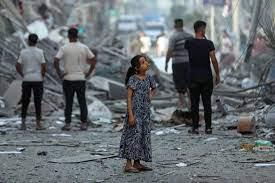
Over the past 18 days, the Gaza Strip has borne witness to a devastating toll on its children, with a reported 2,360 fatalities and a reported 5,364 injuries due to unrelenting attacks, or more than 400 children reportedly either killed or injured daily. Additionally, more than 30 Israeli children reportedly have lost their lives, and dozens remain in captivity within the Gaza Strip. The 18-day period is the deadliest escalation of hostilities in the Gaza Strip and Israel that the UN has witnessed since 2006.
Almost every child in the Gaza Strip has been exposed to deeply distressing events and trauma, marked by widespread destruction, relentless attacks, displacement, and severe shortages of essential necessities such as food, water, and medicine.
“The killing and maiming of children, abduction of children, attacks on hospitals and schools, and the denial of humanitarian access constitute grave violations of children's rights,” said Adele Khodr, UNICEF Regional Director for the Middle East and North Africa. “UNICEF urgently appeals on all parties to agree to a ceasefire, allow humanitarian access and release all hostages. Even wars have rules. Civilians must be protected – children particularly – and all efforts must be made to spare them in all circumstances.”
The West Bank has also witnessed an alarming surge in casualties, with nearly a hundred Palestinians reportedly losing their lives, including 28 children, and at least 160 children reportedly sustaining injuries. Even before the tragic events of October 7, 2023, children in the West Bank were already grappling with the highest levels of conflict-related violence in two decades, resulting in the loss of 41 Palestinian children and six Israeli children's lives so far this year.
“The situation in the Gaza Strip is a growing stain on our collective conscience. The rate of death and injuries of children simply staggering,” said Khodr. “Even more frightening is the fact that unless tensions are eased, and unless humanitarian aid is allowed, including food, water, medical supplies and fuel, the daily death toll will continue to rise.”
Fuel is of paramount importance for the operation of essential facilities such as hospitals, desalination plants, and water pumping stations. Neonatal intensive care units house over 100 newborns, some of whom are in incubators and rely on mechanical ventilation, making an uninterrupted power supply a matter of life and death.
The entire population of the Gaza Strip, comprising nearly 2.3 million people, is facing a dire and pressing lack of water, which poses grave consequences for children, roughly 50 per cent of the population. The majority of water systems have been severely impacted or rendered non-operational due to a combination of factors, including fuel shortages and damage to vital production, treatment, and distribution infrastructure. Currently, the water production capacity is a mere 5 per cent of its usual daily output.
Vulnerable population groups are resorting to non-potable water sources, including high-salinity and brackish-quality water from agricultural wells. To compound the issue, the five Gaza wastewater treatment plants have ceased operations, primarily because of fuel shortages, leading to over 120,000 cubic meters of wastewater being discharged into the sea.
"The footage of children being rescued from beneath the rubble, injured and in distress, while trembling in hospitals as they await treatment, portrays the immense horror these children are enduring. But without humanitarian access, the deaths from attacks could be the tip of the iceberg," said Khodr. "The death toll will increase exponentially if incubators start to fail, if hospitals go dark, if children continue to drink unsafe water and have no access to medicine when they get sick.”
To respond to the dire situation for children in the Gaza Strip, UNICEF is calling for:
An immediate humanitarian ceasefire.
All access crossings into Gaza to be opened for a safe, sustained and unimpeded access of humanitarian aid, including water, food, medical supplies, and fuel.
Urgent medical cases in Gaza to be allowed to leave or to be able to receive critical health services.
Respect and protection for civilian infrastructure such as shelters and schools, and health, electric, water and sanitation facilities, to prevent loss of civilian and children’s lives, outbreaks of diseases, and to provide care to the sick and wounded.
Source: UNICEF
https://www.unicef.org/press-releases/child-casualties-gaza-growing-stain-our-collective-conscience
 FR
FR EN
EN AR
AR








